Actual Application Performance
Our application benchmarks are designed to show application performance results with times being reported in seconds, with lower scores being better. While these tests will show differences between the drives it is important to understand we are no longer measuring the synthetic performance of the hard drive but how well our test platforms perform with each individual drive. The performance of a drive is an integral part of the computer platform but other factors such as memory, CPU, core logic, and even driver choice can play a major role in determining how well the drive performs in any given task.
Adobe Photoshop CS2
We utilize the WorldBench 6.0 test script that applies an extensive series of filters to the test image. CPU, memory, and chipset speed factor heavily in this particular test but we have found this test to be good for hard drive access performance as Photoshop relies heavily on its "paging file" to improve performance.
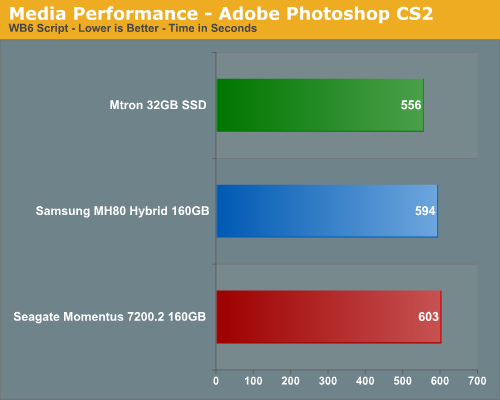
We have seen performance gaps between desktop drives, especially in RAID setups, with this particular test and there was no difference here as the MTRON SSD is about 8% faster than the other drives.
Game Level Load
The Battlefield 2 test measures the time it takes to load the Daqing Oilfields level. Our application timer begins when the start single player icon is initiated and ends when the join game icon is visible.
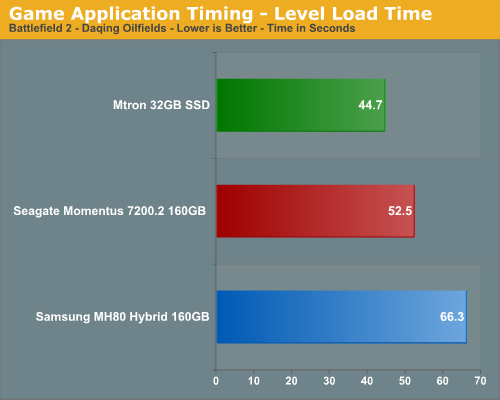
This is one of the more demanding game level load times we test currently and the MTRON drive is around 33% faster than the Samsung drive and 15% faster than the Seagate drive. We could definitely tell a difference between the drives in this test over the course of two gaming sessions. The MTRON SSD product loaded the levels in a smoother manner than our Seagate drive although it was difficult to determine any differences with the Samsung drive except when first starting the game.
Nero Recode
Our encoding test is quite easy - we fire up Nero Recode 2, select our Office Space copy on the hard drive, and perform a shrink operation to allow the entire movie along with extras to fit on a single 4.5GB DVD disc. We leave all options on their defaults except we turn off the advanced analysis option. The scores reported include the full encoding process and are represented in seconds, with lower numbers indicating better performance.
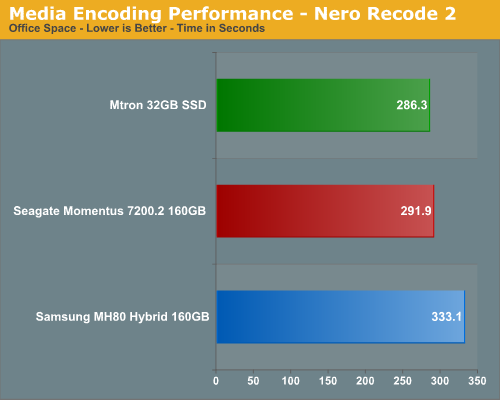
This test is primarily dependent on CPU performance but the write performance of a drive can make small but measurable differences in completion times. As in our HDTach tests, the write performance of the MTRON drive is slightly better than the Seagate and Samsung drives. Our results show the same pattern with the MTRON being 3% faster than the Seagate drive and a surprising 15% better than the Samsung drive.
We expected the NAND flash memory on the Samsung drive and Vista's ReadyDrive feature to compensate for its 5400RPM spindle speed in this test that features large sequential block sizes. The Samsung drive had the highest variation of encoding frames per second. It was an obvious buffer overflow pattern as the frames per second would start at 1100+ and as the buffer filled up the fps would sometimes drop to under 400 and then steadily increase back to the 1100 level before repeating the pattern. The other two drives held a steady fps average throughout this test with the fps variation never being more than 5%. It appears to us there is still some firmware management tuning between the two buffers that need to occur on the Samsung drive for large sequential data block sizes.
WinRAR 3.70
Our WinRAR test measures the time it takes to compress our test folder that contains 444 files, 10 folders, and 602MB of data. While the benchmark is CPU intensive for the compression tests it still requires a fast storage system to keep pace with the CPU. A drive that offers excellent write performance can make a slight difference in this benchmark.
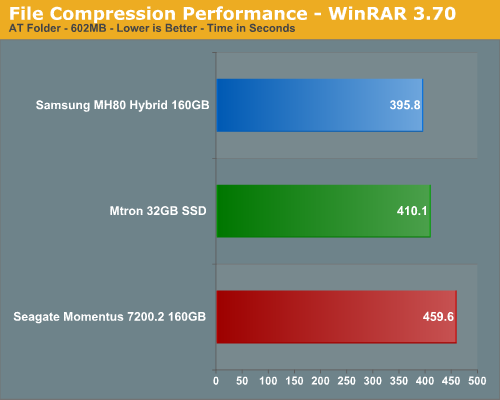
This test relies on the CPU and also the burst rates of the storage system. The Samsung drive obviously thrives on small sequential data block writes as its cache buffers more than make up for the lower spindle and higher access times. Our Samsung unit is 4% quicker than the MTRON unit and 145 better than the Seagate drive.
File Copy Performance
Our file copy test measures the time it takes to transfer our test folder that contains 29 files, 1 folder, and has 7.55GB of data from our source drive to the target test drive. This benchmark is disk write intensive and requires a fast storage system.
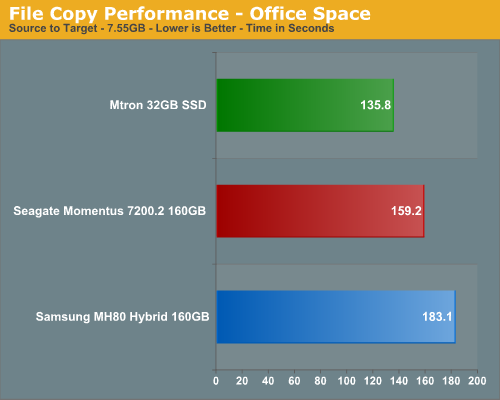
We finish our application tests with a benchmark that favors the MTRON's higher write speeds. As in Nero Recode, where the largest differences in scores were generated with large sequential data block writes, we see the Samsung drive being up to 27% slower than the MTRON drive and 14% when compared to the Seagate unit. However, we find it hard to fault the Samsung drive considering most portable users will be using applications that usually generate small sequential or out-of order data blocks. These type of read or write patterns is something the Samsung drive excels at in initial testing.
Our application benchmarks are designed to show application performance results with times being reported in seconds, with lower scores being better. While these tests will show differences between the drives it is important to understand we are no longer measuring the synthetic performance of the hard drive but how well our test platforms perform with each individual drive. The performance of a drive is an integral part of the computer platform but other factors such as memory, CPU, core logic, and even driver choice can play a major role in determining how well the drive performs in any given task.
Adobe Photoshop CS2
We utilize the WorldBench 6.0 test script that applies an extensive series of filters to the test image. CPU, memory, and chipset speed factor heavily in this particular test but we have found this test to be good for hard drive access performance as Photoshop relies heavily on its "paging file" to improve performance.

We have seen performance gaps between desktop drives, especially in RAID setups, with this particular test and there was no difference here as the MTRON SSD is about 8% faster than the other drives.
Game Level Load
The Battlefield 2 test measures the time it takes to load the Daqing Oilfields level. Our application timer begins when the start single player icon is initiated and ends when the join game icon is visible.

This is one of the more demanding game level load times we test currently and the MTRON drive is around 33% faster than the Samsung drive and 15% faster than the Seagate drive. We could definitely tell a difference between the drives in this test over the course of two gaming sessions. The MTRON SSD product loaded the levels in a smoother manner than our Seagate drive although it was difficult to determine any differences with the Samsung drive except when first starting the game.
Nero Recode
Our encoding test is quite easy - we fire up Nero Recode 2, select our Office Space copy on the hard drive, and perform a shrink operation to allow the entire movie along with extras to fit on a single 4.5GB DVD disc. We leave all options on their defaults except we turn off the advanced analysis option. The scores reported include the full encoding process and are represented in seconds, with lower numbers indicating better performance.

This test is primarily dependent on CPU performance but the write performance of a drive can make small but measurable differences in completion times. As in our HDTach tests, the write performance of the MTRON drive is slightly better than the Seagate and Samsung drives. Our results show the same pattern with the MTRON being 3% faster than the Seagate drive and a surprising 15% better than the Samsung drive.
We expected the NAND flash memory on the Samsung drive and Vista's ReadyDrive feature to compensate for its 5400RPM spindle speed in this test that features large sequential block sizes. The Samsung drive had the highest variation of encoding frames per second. It was an obvious buffer overflow pattern as the frames per second would start at 1100+ and as the buffer filled up the fps would sometimes drop to under 400 and then steadily increase back to the 1100 level before repeating the pattern. The other two drives held a steady fps average throughout this test with the fps variation never being more than 5%. It appears to us there is still some firmware management tuning between the two buffers that need to occur on the Samsung drive for large sequential data block sizes.
WinRAR 3.70
Our WinRAR test measures the time it takes to compress our test folder that contains 444 files, 10 folders, and 602MB of data. While the benchmark is CPU intensive for the compression tests it still requires a fast storage system to keep pace with the CPU. A drive that offers excellent write performance can make a slight difference in this benchmark.

This test relies on the CPU and also the burst rates of the storage system. The Samsung drive obviously thrives on small sequential data block writes as its cache buffers more than make up for the lower spindle and higher access times. Our Samsung unit is 4% quicker than the MTRON unit and 145 better than the Seagate drive.
File Copy Performance
Our file copy test measures the time it takes to transfer our test folder that contains 29 files, 1 folder, and has 7.55GB of data from our source drive to the target test drive. This benchmark is disk write intensive and requires a fast storage system.

We finish our application tests with a benchmark that favors the MTRON's higher write speeds. As in Nero Recode, where the largest differences in scores were generated with large sequential data block writes, we see the Samsung drive being up to 27% slower than the MTRON drive and 14% when compared to the Seagate unit. However, we find it hard to fault the Samsung drive considering most portable users will be using applications that usually generate small sequential or out-of order data blocks. These type of read or write patterns is something the Samsung drive excels at in initial testing.










25 Comments
View All Comments
John Kotches - Thursday, December 6, 2007 - link
It is quite misleading to show the theoretical limitations of other interfaces against the actual performance of a drive.If this were thorough, it would show drives of each interface type against its theoretical maximum.
Dataland - Wednesday, November 21, 2007 - link
(Pingback) Many computer users know that their computer's data is stored on a mechanical hard drive. What many people don’t realize is just how old ...http://dataland.wordpress.com/2007/11/21/the-futur...">http://dataland.wordpress.com/2007/11/21/the-futur...
genotypewriter - Wednesday, September 19, 2007 - link
(1)In your File Compression Performance test, you claim that the "Samsung drive thrives on small sequential data blocks"... ok, why? Because of its on-board flash memory? Then why should the Mtron, which is made up entirely of flash memory, not be faster than the Samsung?
If you look at the HDTach results, you'll see the CPU utilisation being 6%,4% and 3% respectively for the Mtron, Seagate and the Samsung. Although "File Compression" has the word "file" in it, it's a computationally-intensive task before being an IO-heavy task. If it was primarily an IO-based task then there's no reason why the Mtron setup shouldn't be the first. If it was only CPU based then the Seagate should come before the Mtron, but it didn't. It would make a lot more sense to say that the Samsung is faster here because of its low CPU usage in combination with its on-board flash.
It seems like you're using existing benchmark programs without thinking exactly how they relate to what's being tested. You may say this article is an intial test" or "quick and dirty" or something similar but you still make some wrong conclusions.
(2)
You go on to make more unjustifiable claims in favour of Samsung at the end of the File Copy Performance test saying "we find it hard to fault the Samsung drive considering most portable users will be using applications that usually generate small sequential or out-of order data blocks. These type of read or write patterns is something the Samsung drive excels at in initial testing."... So where are the test results that show this? You were surely not pointing at the Photoshop (workstation *cough*) test right where the Samsung was about 1% (wow!) faster than the Seagate, right? And at the point you made these comments you hadn't even gone in to the OS speed tests... and even if you did, how can you keep to your claim when the Samsung is much faster than the Seagate when entering/exiting OS hybernation mode that writes/reads the entire (yes, SuperFetch'ed) 4GB of RAM on your test laptop to disk, sequentially? Shouldn't the Seagate be faster than the Samsung here, if your claims are true?
(3)
And why on earth did you use a laptop with 4GB RAM to test hard drive performance? Wouldn't you have been able to learn a lot more if it was a 512MB/1GB laptop? Yes, there are laptops still out there that come with 1GB or less RAM... especially the ones that are more portable. These happen to be the same laptops that can benefit from the low weight and low power consumption of a SSD.
(4)
Also, why not give times for Windows start up/shutdown? Also, where's the Samsung SSD? Or is that for another half-baked article?
Please use some quality control on your articles because this one is not any more useful than the typical ones that appear on C|*ET.
goku - Tuesday, August 21, 2007 - link
In the mean time, people can get CF to mini IDE adapters to put into their laptops, allowing solid state storage for a fraction of the price of these SSD drives, though the speed in which the data is read is dependent on the adapter's speed and the CF card's speed.araczynski - Sunday, August 19, 2007 - link
hardly impressive for the price, i suppose if you're rich and bored...finbarqs - Sunday, August 19, 2007 - link
is this different than RAM drives? Meaning that this does NOT need a backup battery or power adapter to keep it charged so it doesn't loose it's memory?Spoelie - Sunday, August 19, 2007 - link
Yes8steve8 - Saturday, August 18, 2007 - link
the toshiba r500 is soon shipping witha 64GB sata ssd (i believe a sandisk unit)its $3000 fully configured with 2gb ram/ dvdrw 1.06 Ultra low voltage core 2 duo... led 12.1" widescreen etc etc... very small very light...
if this is $1500 for 32GB..why is a 64GB drive only carrying a $500 premium in these R500's... is there a big difference in performance? 32gb is really too small...
could you plaese review this notebook specifically... the R500.. it seems very very cool.
AnnihilatorX - Saturday, August 18, 2007 - link
MTRON SSD has a premium price of $1499 for 32GBWhile SanDisk 32GB has a price of $500
I think SanDisk 64GB is around $1000 still cheaper than MTRON 32GB
The difference between them is MTRON is the fastest SSD in the world. Sandisk's transfer rate is around
50MB/s
brundlefly - Sunday, August 19, 2007 - link
More importantly, the mtron surpasses all mechanicals while the Samsung does not.Not all SSDs are created equal.